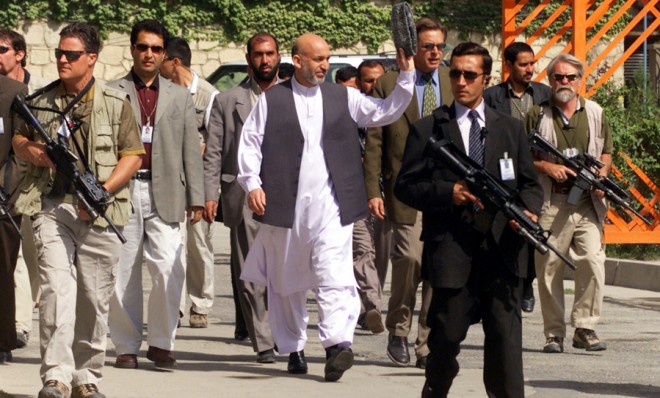The biggest source of corruption in Afghanistan: The United States?
A new report says that the CIA has been sending bags of cash to Hamid Karzai totaling tens of millions of dollars

A free daily email with the biggest news stories of the day – and the best features from TheWeek.com
You are now subscribed
Your newsletter sign-up was successful
It's like something out of a mob movie: Suitcases, backpacks, and sometimes plastic shopping bags packed full of cash, delivered discretely to a willing politician.
The purported money-exchangers: The Central Intelligence Agency and Afghanistan's President Hamid Karzai. According to a report in The New York Times, Karzai's office in Kabul has been on the receiving end of tens of millions of dollars from the U.S., and is still getting paid to this day.
Khalil Roman, Karzai's deputy chief of staff from 2002 until 2005, called it "ghost money," according to the Times. "The biggest source of corruption in Afghanistan," one American official told the paper, "was the United States."
The Week
Escape your echo chamber. Get the facts behind the news, plus analysis from multiple perspectives.

Sign up for The Week's Free Newsletters
From our morning news briefing to a weekly Good News Newsletter, get the best of The Week delivered directly to your inbox.
From our morning news briefing to a weekly Good News Newsletter, get the best of The Week delivered directly to your inbox.
While the CIA refused to comment on the story, Matthew Rosenberg, who reported the Times story, said on Twitter that Karzai confirmed his account of events:
The purpose of the cash was to "maintain access to Mr. Karzai and his inner circle and to guarantee the agency's influence at the presidential palace." Most people, of course, would call that a bribe.
Where did the money go? Politicians and warlords, including some who had connections to Afghanistan's drug trade, and even the Taliban. The money appeared to have no restrictions placed on it.
To be fair, if the United States had not been paying Karzai, he might not still be in power. Steve LeVine of Quartz points out that in 1992, Mohammad Najibullah, the Russian-backed president of Afghanistan, ran out of money to pay off Abdul Rashid Dostum, an influential northern warlord, after Moscow pulled its patronage. The result? Dostum gathered his allies and overthrew Najibullah.
A free daily email with the biggest news stories of the day – and the best features from TheWeek.com
Still, both Afghan and American officials have called the bribes ineffective, saying that the CIA "has greased the wheels of the same patronage networks that American diplomats and law enforcement agents have struggled unsuccessfully to dismantle, leaving the government in the grips of what are basically organized crime syndicates," writes Rosenberg.
Another indication that the CIA's bags of cash are questionable: Iran had, for some time, been doing the same thing — to little effect. Tehran eventually halted its payments, but, at the very least, Afghan officials tell the Times, Iran was more transparent about its donations, sending millions of dollars through Karzai's chief of staff, who would then have it stored in a state-run bank and the contribution announced at the next cabinet meeting.
Afghanistan, the third most corrupt country in the world, according to Transparency International's 2012 Corruption Index, is well-known for its illicit government dealings — but it seems now we have pretty clear evidence that the U.S. plays a big role in keeping Afghanistan dishonest.
Keith Wagstaff is a staff writer at TheWeek.com covering politics and current events. He has previously written for such publications as TIME, Details, VICE, and the Village Voice.